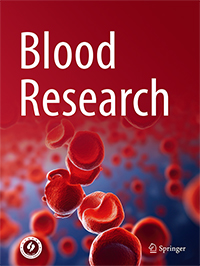Case Report
Korean J Hematol 2009; 44(3):
Published online September 30, 2009
https://doi.org/10.5045/kjh.2009.44.3.139
© The Korean Society of Hematology
T 세포 거대과립림프구성백혈병 1예
송성헌 정승민 황덕원 최지영 유기덕 홍현석 안용우 노영욱 이지선 박병배 최정혜 김인순 이웅수 이영열
한양대학교 의과대학 내과학교실,진단검사의학교실
T-cell Large Granular Lymphocytic Leukemia
T cell large granular lymphocytic leukemia (T-LGL leukemia) is defined as a clonal proliferative disorder of CD3+ cytotoxic T cells. T-LGL leukemia usually expresses CD3+, CD4-, CD8+, CD16+, CD56- and CD57+ cell markers, and this represents a rearrangement of the T cell receptor (TCR) gene. The clinical course is indolent in most cases, but on rare occasions, when CD3+ and CD56+ are expressed on the leukemic cells, it can be more aggressive. We experienced a patient with T-LGL leukemia and the disease was indolent at the time of diagnosis, and so any specific treatment was not required. Two years after the initial diagnosis, her clinical course became quite aggressive as the CD 56+ cell surface antigen was expressed. We report here on the first case of T-LGL leukemia in Korea and we review the relevant literature. (Korean J Hematol 2009;44:139-143.)
Keywords T-cell large granular lymphocytic leukemia, CD56 antigen, CD3 antigen, Rheumatoid arthritis
Article
Case Report
Korean J Hematol 2009; 44(3): 139-143
Published online September 30, 2009 https://doi.org/10.5045/kjh.2009.44.3.139
Copyright © The Korean Society of Hematology.
T 세포 거대과립림프구성백혈병 1예
송성헌 정승민 황덕원 최지영 유기덕 홍현석 안용우 노영욱 이지선 박병배 최정혜 김인순 이웅수 이영열
한양대학교 의과대학 내과학교실,진단검사의학교실
T-cell Large Granular Lymphocytic Leukemia
Sung Heon Song, Seong Min Chung, Deok Won Hwang, Ji Young Choi, Ki Deok Yoo, Hyun Seok Hong, Yong Woo Ahn, Young Wook Roh, Ji Sun Lee, Byoung Bae Park, Jung Hye Choi, In Soon Kim, Woong Soo Lee, Young Yiul Lee
Departments of Internal Medicine, Clinical Pathology, College of Medicine, Hanyang University, Seoul, Korea
Abstract
T cell large granular lymphocytic leukemia (T-LGL leukemia) is defined as a clonal proliferative disorder of CD3+ cytotoxic T cells. T-LGL leukemia usually expresses CD3+, CD4-, CD8+, CD16+, CD56- and CD57+ cell markers, and this represents a rearrangement of the T cell receptor (TCR) gene. The clinical course is indolent in most cases, but on rare occasions, when CD3+ and CD56+ are expressed on the leukemic cells, it can be more aggressive. We experienced a patient with T-LGL leukemia and the disease was indolent at the time of diagnosis, and so any specific treatment was not required. Two years after the initial diagnosis, her clinical course became quite aggressive as the CD 56+ cell surface antigen was expressed. We report here on the first case of T-LGL leukemia in Korea and we review the relevant literature. (Korean J Hematol 2009;44:139-143.)
Keywords: T-cell large granular lymphocytic leukemia, CD56 antigen, CD3 antigen, Rheumatoid arthritis





 PDF
PDF Standard view
Standard view Export citation
Export citation Share
Share  Previous Article
Previous Article



